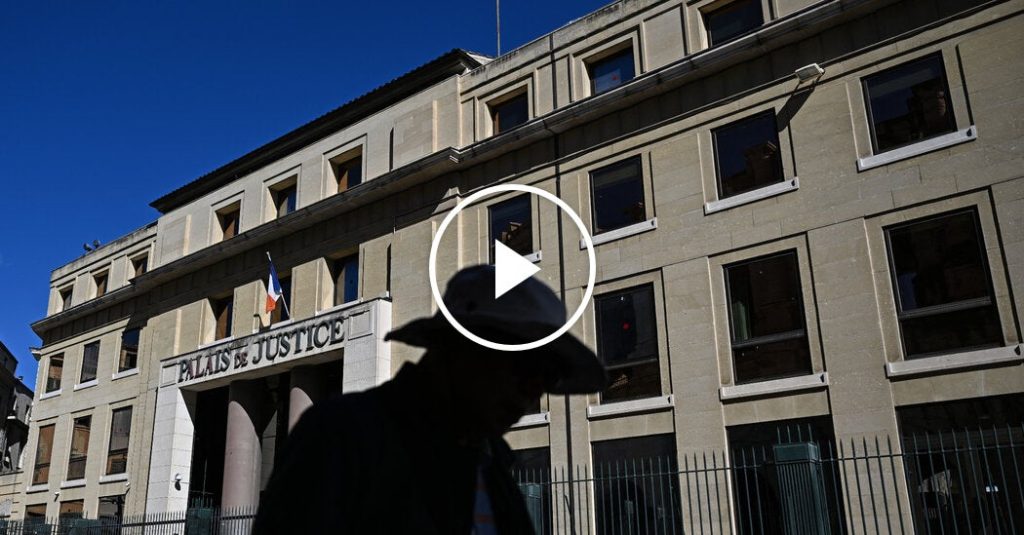Gisèle Pelicot Returns to Court: A Woman’s Courage Facing Her Abuser’s Appeal
The Harrowing Return to France’s Hall of Justice
On a crisp autumn morning, Gisèle Pelicot walked with measured steps toward the imposing Palais de Justice, her silhouette cast against the historic building’s grand façade. The 74-year-old woman, who has become an unexpected symbol of resilience in France’s fight against sexual violence, returned to court this week to face one of her attackers once more. This time, she attended the appeal hearing of a man previously convicted of raping her while she was in a drugged state—unconscious assaults orchestrated and recorded by her now ex-husband, Dominique Pelicot. As she approached the courthouse steps, supporters gathered quietly, their presence a testament to how one woman’s courage has galvanized a nation’s reckoning with sexual violence.
The case that has shocked France began in September 2023, when initial investigations revealed that Dominique Pelicot had systematically drugged his wife for nearly a decade, inviting dozens of men into their marital home to assault her unconscious body. The scope of the crimes—involving 50 men ranging in age from 26 to 74—and the methodical nature of Dominique Pelicot’s actions created a profound sense of horror across the country. Investigators discovered thousands of videos and photos meticulously archived on his computer, documenting assaults that occurred while Gisèle remained completely unaware. The revelation came only after police arrested Dominique Pelicot on an unrelated charge and discovered the disturbing evidence that would eventually expose one of France’s most shocking criminal cases.
Breaking Silence and Changing the Narrative
“I chose to waive my anonymity because I did nothing wrong. I have nothing to be ashamed of,” Gisèle declared during the original trial, a statement that resonated throughout France and beyond. In a remarkable departure from the traditional treatment of sexual assault victims, she insisted on an open trial, allowing public scrutiny of a case that might otherwise have remained hidden behind closed doors. Legal experts note that her decision transformed what could have been a private tragedy into a watershed moment for French society’s understanding of consent and domestic abuse. “Madame Pelicot redefined victimhood by refusing to carry shame that wasn’t hers,” explained Parisian attorney Marie Fontaine, who specializes in cases involving sexual violence. “By showing her face, attaching her name to this horror, she shifted the burden of shame back to the perpetrators where it belongs.”
The original trial concluded with Dominique Pelicot receiving a 20-year prison sentence, while dozens of co-defendants received sentences ranging from two to 18 years. However, as is common in the French legal system, several convicted men have exercised their right to appeal, forcing Gisèle to relive her trauma through additional court proceedings. The appellant in today’s hearing, whose identity is protected under French law during the appeals process, was originally sentenced to 12 years for participating in multiple assaults. His legal team now argues that evidence concerning his awareness of Gisèle’s drugged state was insufficient to support the conviction—a claim that prosecution attorneys vehemently dispute based on video evidence showing clear indications of her unconscious state.
A Nation Transformed by One Woman’s Stand
The case has profoundly affected French society, sparking nationwide demonstrations against sexual violence and prompting lawmakers to propose strengthened legislation regarding consent and spousal abuse. “Before Pelicot, we struggled to have meaningful conversations about the intersection of marriage, consent, and violence,” noted Simone Bernard, director of Nous Toutes, a prominent French feminist organization. “Her bravery created space for thousands of women to recognize and speak about violations within their own relationships.” Government statistics indicate that reports of suspected drug-facilitated sexual assault have increased by 37% since the case first made headlines, suggesting that the publicity has empowered more victims to come forward.
The cultural impact extends beyond legal channels, with documentary filmmakers, authors, and artists creating works examining the societal conditions that enabled such crimes to continue undetected for years. A television series exploring the psychology of bystanding and complicity is currently in production, while several books analyzing the case through legal, sociological, and feminist perspectives have already become bestsellers. Perhaps most significantly, educational institutions across France have incorporated discussions of the case into curriculum addressing consent and healthy relationships. “We’re witnessing a generational shift in how young people understand bodily autonomy,” explained education minister Claudine Moreau. “The Pelicot case has become a reference point for conversations that previously seemed impossible to initiate in classrooms.”
The Appeal Process: Justice Revisited
Today’s hearing represents just one of several appeals scheduled in the complex legal aftermath. Court observers note the unusual dynamic as Gisèle, now divorced and using her maiden name in personal life while maintaining “Pelicot” for public advocacy, confronts each appellant individually rather than in the group trial format used initially. “The fragmentation of the appeals process creates additional burden on Madame Pelicot,” explained judicial analyst Pierre Dumont. “Each hearing reopens wounds that might otherwise begin healing, yet she remains committed to seeing justice through to its conclusion, regardless of personal cost.”
The appellant’s defense strategy centers on claims that video evidence doesn’t conclusively prove he understood Gisèle was drugged rather than intoxicated—a distinction without difference under French law regarding consent, but one that defense attorneys hope might reduce culpability. Prosecution attorneys countered with forensic analysis of the recordings, highlighting specific indicators of unconsciousness that would have been impossible to misinterpret. “The videos are explicit in showing Madame Pelicot completely unresponsive,” stated lead prosecutor Jean Mercier. “No reasonable person could have mistaken her state for anything other than complete incapacitation.” The three-judge panel is expected to deliver a verdict within two weeks, though legal experts anticipate the appeals process across all defendants could extend through much of next year.
Legacy of Courage: Transforming Trauma into Change
As proceedings concluded for the day, Gisèle emerged from the courthouse surrounded by her grown children and supporters. Though visibly drained, she offered brief comments that encapsulated the journey she never sought but has navigated with remarkable dignity: “Each time I enter that courtroom, I carry with me the stories of women who have written to me, who recognize in my experience echoes of their own silenced suffering. I stand not just for myself but for them.” This sentiment reflects the extraordinary correspondence she has received—over 30,000 letters from across France and internationally—many from women sharing their own experiences of violation within relationships.
The Pelicot case has transcended its legal boundaries to become a defining moment in France’s ongoing struggle with sexual violence and consent. Organizations working with sexual assault survivors report the “Pelicot effect”—women specifically citing Gisèle’s example when seeking help, sometimes decades after their own assaults. Psychological experts suggest her public stance has created a new paradigm for processing trauma. “Madame Pelicot demonstrated that victimhood need not be a permanent identity but can become a platform for reclaiming agency,” noted Dr. Sophie Tremblay, a leading trauma specialist. “By refusing secrecy, she disrupted the isolation that often compounds trauma.” As France watches this latest chapter unfold in court, the woman at its center continues her unlikely transformation from victim to catalyst, her quiet dignity challenging a society to confront uncomfortable truths about violence that has too long remained hidden within the presumed sanctuary of marriage. The verdicts in these appeals will eventually be rendered, but Gisèle Pelicot’s impact on French society has already been decided: an ordinary woman whose extraordinary courage created an inflection point in a nation’s understanding of consent, complicity, and justice.











